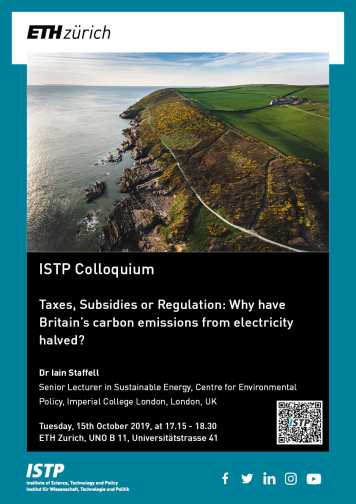Colloquium: Dr Iain Staffell
Tuesday, 15th October 2019, at 17.15 - 18.30
ETH Zurich, UNO B 11, Universitätstrasse 41
Taxes, Subsidies or Regulation: Why have Britain’s carbon emissions from electricity halved?

The UK leads the world in decarbonising electricity. Carbon dioxide emissions more than halved over the last five years, as coal power stations have retired and been replaced by renewables. The technology shift may be clear, but what were the underlying drivers which caused this shift?
It is useful for policymakers to know which regulations and policies have been effective at reducing emissions, and which have had impacts on the cost of energy. It is not possible to study these in isolation though as a country is not a laboratory: the policy landscape is constantly changing, as are external forces such as international fuel prices and the weather.
This talk gives an overview of how the UK radically decarbonised its power system, and the lessons for other countries with heavy fossil-fuel dependency. It uses Shapley values (from cooperative game theory) to disentangle the impact of the major policy changes between 2012-19. As economists would expect, taxing carbon has been the most cost-effective method, but combining it with energy efficiency, renewable subsidies and clean air legislation allowed six times more CO2 to be saved than carbon pricing would have achieved alone.
About Dr Iain Staffell
Dr Iain Staffell is a multi-disciplinary scientist holding degrees in Physics, Chemical Engineering and Economics. He is a Senior Lecturer in Sustainable Energy at Imperial College London. His research centres around decarbonising energy and ranges from the economics of battery storage and clean energy policies, to modelling the technical potential for wind and solar power, to assessing the state of hydrogen, low-carbon freight shipping, small modular nuclear reactors and the future need for heating and cooling. Iain is a developer of the external page Renewables.ninja and external page Electric Insights platforms, and has published 60 papers and book chapters (external page see recent work).
You can download the Download slides from the Colloquium Talk (PDF, 5.2 MB).
You can read a Summary of the Colloquium Talk on our Reports page.